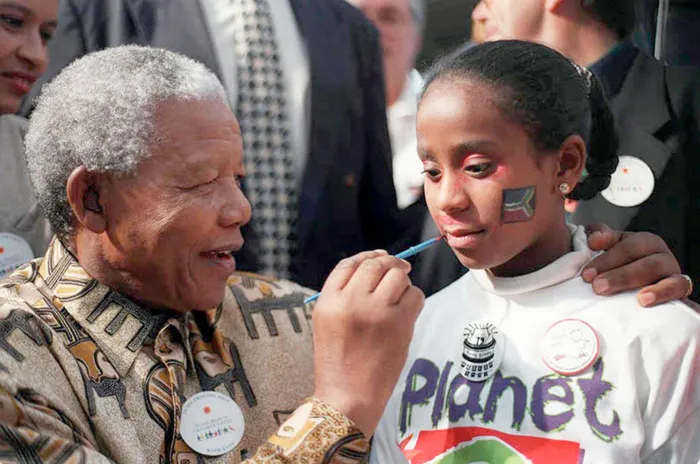Abuse of women and children a blemish on Madiba’s legacy

Picture: ANA/taken on July 4,1997 – South African President Nelson Mandela, left, paints the face of a young guest at a party held in honour of his 79th birthday, in Cape Town, July 4. The late president’s birthday is celebrated on July 18, which the United Nations has declared Nelson Mandela International Day. It recognises Mandela’s values and dedication to humanity, by fighting for gender equality and the rights of children and other vulnerable groups, as well as fighting against poverty, among others, the writer says.
By Zanele Zuma
Writing about how the legacy of Nelson Mandela can be protected around his support and care for children is a difficult one in the wake of what is happening in South Africa. In retrospect, as we approach Mandela Day, one might ask how much his legacy has been destroyed and what the future ramifications are for South African women and children whose lives are slowly worsening because of social ills and the atrocities committed against them.
Resolution A/RES/64/13 of the UN General Assembly declared July 18 “Nelson Mandela International Day”, in recognition of the former president’s contribution to the culture of peace and freedom. It further recognises Mandela’s values and dedication to humanity, by fighting for gender equality and the rights of children and other vulnerable groups, as well as fighting against poverty, among others.
One cannot confidently talk about protecting the legacy of humanity in the South African context when the killing of women and children is taking its toll. Reports of corruption and maladministration by senior officials in the public and private sectors are compelling evidence of the stagnation of good principles.
Escalating unemployment has resulted in poverty and high crime rates in almost all communities, reinforcing their diminished living conditions. Amid the socio-economic compromising state, there seems to be neither intervention for support nor poverty alleviation strategies. South Africa is witnessing the erosion of principles of ubuntu and humanity daily.
The violation of children continues. They are raped, impregnated by older men, forced into marriage and, in extreme cases, face death. Sadly, most of the time when we see any action being taken in a form of campaigns or protest marches, it is after such crimes have been committed. South Africa is widely acknowledged as having one of the most progressive and transformative constitutions in the world, with its primary concern to facilitate change in political, social and economic relations.
Mandela participated in its formulation. Nevertheless, in some situations, attempts to reinforce such a constitution are increasingly met with lawlessness, corruption, instability and other divisive actions. The tenets of the Constitution are not manifested in practise and adherence, and that is slowly driving humanity and the principles of ubuntu to the verge of collapse.
The scourge of gender-based violence (GVB), which includes violence against children, has spread to all facets of life, from home to work, in the streets, places of worship, political space, schools and universities. It takes many forms, including physical, sexual, economic, emotional and psychological, inflicting a lot of harm on the most vulnerable women and children. The spiralling of GVB and femicide (GBVF+) and the increasing cases of the violation and killing of children continues to make South Africa unsafe.
When the world celebrates Mandela Day on July 18 and South Africa Mandela Month, there is neither much improvement nor the achievement of what Mandela envisioned and lived for. There remains a widening gap between the rich and the poor that is exacerbated by unemployment which gravely affects marginalised communities.
When Mandela delivered one of his speeches after his release from prison, he instructed the masses who had been involved in violence to throw their arms into the sea and go back to school. In one of his speeches, Mandela said: “Education is the most powerful weapon you can utilise to transform the world.”
Indeed, education is considered a tool to alleviate poverty including that of a black girl child. However, some children are unable to attend school because of several factors, among them failing infrastructure due to poor service delivery, gangsterism manifested by drug dealing rivalries, girl-child pregnancies and early sexual activities that are partly premised in impoverished communities.
There is a dire need to protect the legacy Mandela envisioned and improve it, not only on the celebratory days but every day. The question that a South African must ask is: “How can we retain and build from what Mandela envisioned.”
We need to reinvest in the spirit of ubuntu, where we do good things without expecting anything in return. Often, South Africans become attention-seekers, where any good gesture must be followed by cameras. Ubuntu should have no boundaries or limits.
Politicians, as patriots, should be seeking out the needy people and helping to feed the hungry, without expecting to gain a vote. They need to focus on setting a good example. The people who were affected by the 2022 floods in KwaZulu-Natal are living in community halls and the rights of children are being compromised.
This should be an opportunity for people who are leading the country to extend the spirit of ubuntu and humanity, rather than actions that are contrary to all that is considered Mandela’s legacy.
Dr Zanele Zuma is a post-doctoral Research Fellow in the School of Public Health at Wits University